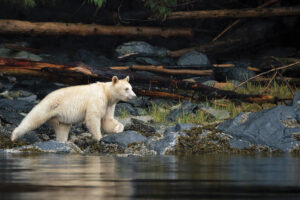
People & Culture
Kahkiihtwaam ee-pee-kiiweehtataahk: Bringing it back home again
The story of how a critically endangered Indigenous language can be saved
- 6310 words
- 26 minutes
This article is over 5 years old and may contain outdated information.
People & Culture

Igor Lehnherr spends a bone-chilling amount of time waist-deep in frigid Arctic water adding to his growing body of environmental research. By analyzing sediment and water chemistry, Lehnherr can develop a picture of several hundred years of lake environments and then predict reactions to imminent and ongoing climate change. This 32-year-old postdoctoral researcher from the University of Waterloo is representative of a new generation of researchers who are able to support their passion for the Arctic and northern science thanks to private funding. “I’ve already been able to spend time in the Arctic and will return again next year,” says Lehnherr. “I would not have been able to do this without the funding from The W. Garfield Weston Foundation.”
Lehnherr is not alone. Naomi Harms, a Ph.D. candidate at the University of Saskatchewan, is studying the deaths of thousands of eider ducks in Canada’s North. A Weston Foundation scholarship has enabled her to study the spread of avian cholera among these Arctic sea ducks in multiple northern locations, especially at the largest breeding grounds on East Bay Island, Nunavut. Working closely with Inuit communities and other researchers, Harms is helping determine the potential sources of bacteria that trigger widespread outbreaks of the disease.
Enabling northern research is a principal tenet of the Weston Foundation’s Science in Canada’s North program, and its support to university students is a means of ensuring the continuation of a rich tradition of scientific enquiry in that region. “Looking beyond IPY, The W. Garfield Weston Foundation had the foresight to help keep the momentum going,” says Peter Geller, ACUNS president.
Since the inception of its northern research program during International Polar Year, the Weston Foundation has funded 79 postdoctoral, Ph.D. and master’s level students from Canadian universities in the early stages of their Arctic science careers.
In time, these students will join Canada’s senior scientific ranks, having contributed to our collective body of northern scientific knowledge.

Are you passionate about Canadian geography?
You can support Canadian Geographic in 3 ways:

People & Culture
The story of how a critically endangered Indigenous language can be saved

People & Culture
The death of an unhoused Innu man inspired an innovative and compassionate street outreach during the nightly curfew in 2021

Wildlife
How ‘maas ol, the spirit bear, connects us to the last glacial maximum of the Pacific Northwest

Places
In Banff National Park, Alberta, as in protected areas across the country, managers find it difficult to balance the desire of people to experience wilderness with an imperative to conserve it